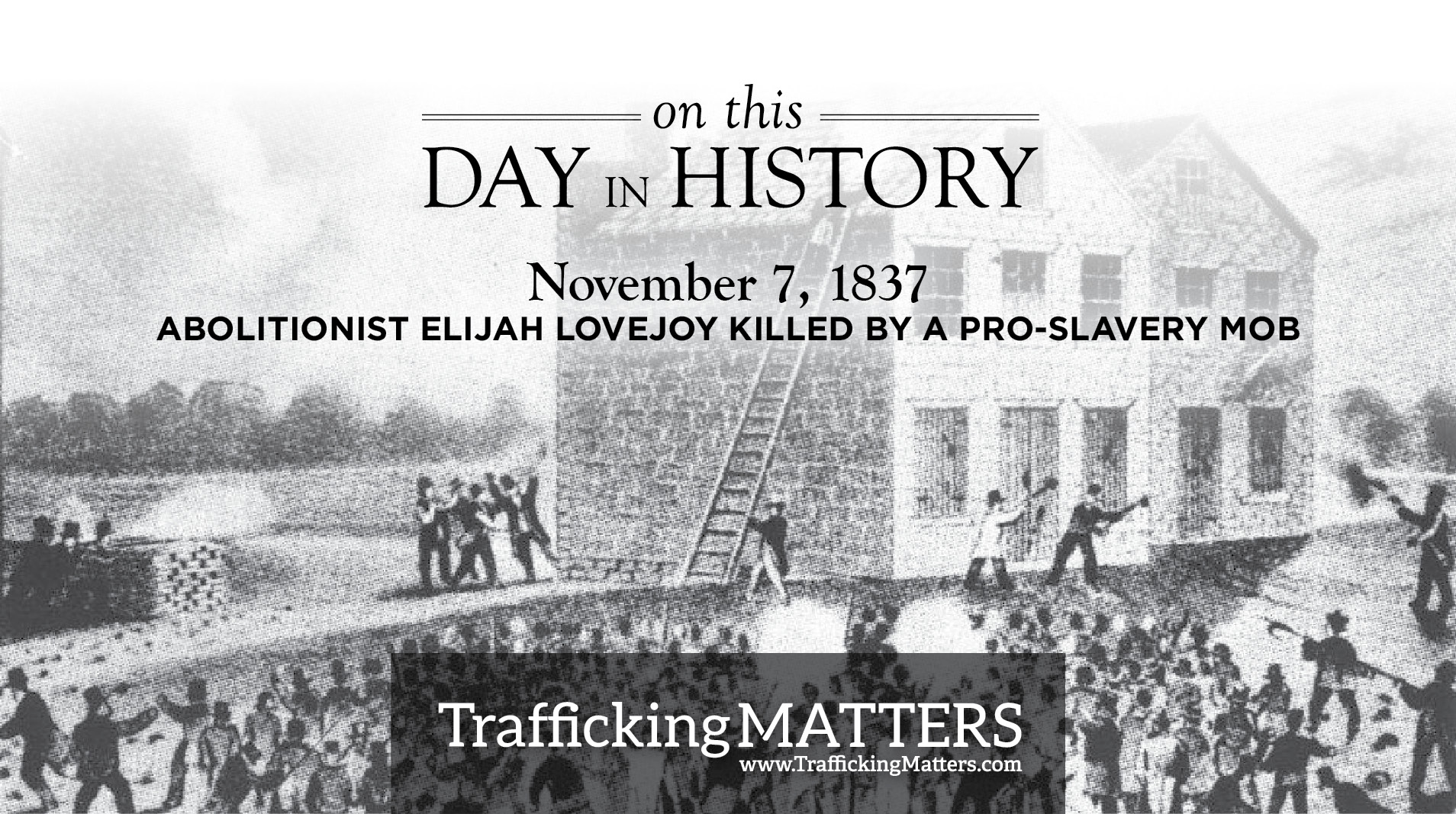By: MOLLY WICKER
On November 7, 1837, Elijah Parish Lovejoy was killed by a pro-slavery mob while defending the site of his anti-slavery newspaper The St. Louis Observer. His death both deeply affected many individuals who opposed slavery and greatly strengthened the cause of abolition.
Lovejoy, born November 9, 1802, in Albion, Maine, decided to seek his fortune in the Midwest after graduating from Waterville College. Short on funds, he walked to St. Louis, Missouri, where, over time, he became editor and part-time owner of The St. Louis Times. His name appeared in the Times for the first time on August 14, 1830, and for the last time – as editor – on February 18, 1832.
In 1832, caught up in the powerful religious revival movement sweeping across the United States and its frontier territories, Lovejoy experienced a conversion, leading him to sell his stake in the paper and enroll in Princeton Theological Seminary in New Jersey. Two years later, a group of St. Louis businessmen who sought to start a newspaper to promote religious and moral education recruited Lovejoy to return to the city, this time as editor of The St. Louis Observer.
Supported by abolitionist friends such as Edward Beecher (the brother of Harriet Beecher Stowe, author of Uncle Tom’s Cabin), Lovejoy became increasingly more radical in his anti-slavery editorials. He first supported African recolonization then endorsed gradual emancipation. By 1835, he sanctioned abolition in the District of Columbia, and, by 1837, championed immediate universal emancipation.
Lovejoy’s editorials raised local anger, despite the fact that they increased the paper’s national circulation. A group of local citizens, including future Senator Thomas Hart Benton, declared that freedom of speech did not include the right to speak against slavery. As mob violence grew over the issue of emancipation, Lovejoy, now a husband and father, decided to move his family to the town of Alton, across the Mississippi River, and in the free state of Illinois, where he believed he could write without fear. When his printing press was shipped to Alton, however, local thugs smashed it when it arrived at the docks. In spite of this, local citizens raised money for a new press, and Lovejoy published successfully for another year.
His position on slavery continued to be unequivocal, and on July 6, 1837, he published another editorial condemning the practice. His press was destroyed again that night, as well as his later replacement. Sensing the importance of his work and its accompanying danger, friends of Lovejoy organized a militia in order to secretly buy and install yet another press.
The violence escalated further in November 1837. A mob formed at the site of the arrival of the Missouri Fulton, the steamboat carrying the press. They greeted the ship and tried to set fire to warehouse where the equipment was being stored, driving out the militia. As Lovejoy ran to defend the site from impending flames, he was shot.
He was buried on November 9, his 35th birthday and two days after his assassination on November 7. Throughout the North and West, membership in anti-slavery societies increased sharply following Lovejoy’s death.
Hailed by John Quincy Adams as the “first American martyr to the freedom of the press and the freedom of the slave,” the cruel circumstances of Lovejoy’s death inspired abolitionists across the country, and he became a symbol of reform. Many historians have pointed to his death as a primary catalyst in the fight against slavery. History also remembers Lovejoy as a defender of the First Amendment freedom of the press, for which he is remembered as the first of more than 2,200 names on Washington, D.C.’s Newseum’s Journalists Memorial.
In 1837, officials in Illinois made little comment about Lovejoy’s death, with one notable exception. Twenty-eight year old State Representative Abraham Lincoln stated publicly:
Let every man remember that to violate the law, is to trample on the blood of his father, and to tear the charter of his own, and his children’s liberty . . . Let reverence for the laws be breathed by every American mother . . . in short, let it become the political religion of the nation . . .
The unjust murder of Lovejoy seems to have been a seminal event in the formation of Lincoln’s political views. Twenty years after Lovejoy’s death – and before becoming president – Lincoln wrote to his friend, the Reverend James Lemen, reflecting, “Lovejoy’s tragic death for freedom in every sense marked his sad ending as the most important single event that ever happened in the new world.” (March 2, 1857). He went on to say, “The madness and pitiless determination with which the mob steadily pursued Lovejoy to his doom marks it as one of the most unreasoning and unreasonable in all time, except that which doomed the Savior to the cross.”




